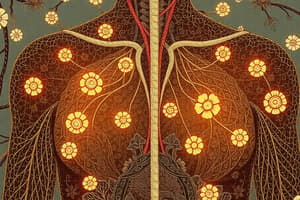Podcast
Questions and Answers
What is the primary function of the lymphatic system?
What is the primary function of the lymphatic system?
- Producing red blood cells
- Returning excess fluids from the blood capillaries back to the bloodstream (correct)
- Absorbing excess fluids from the gastrointestinal tract
- Converting nutrients into energy for the body
What is the role of lymph in the body?
What is the role of lymph in the body?
- Exchanging materials and gases between blood and tissues (correct)
- Helping with muscle contractions
- Acting as a fluid to clean the lymphatic vessels
- Supplying oxygen to the lymph nodes
What happens when there is a failure in returning lymph to the bloodstream?
What happens when there is a failure in returning lymph to the bloodstream?
- Better waste removal
- Increased blood pressure
- Decreased blood pressure, oxygen delivery issues, and waste removal problems (correct)
- Improved oxygen delivery
What effect can blockages in the lymphatic system have?
What effect can blockages in the lymphatic system have?
How do lymphatic vessels prevent backflow of lymph?
How do lymphatic vessels prevent backflow of lymph?
In addition to fighting infections, what other role does the lymphatic system play in the body?
In addition to fighting infections, what other role does the lymphatic system play in the body?
What is the main function of tonsils in the lymphatic system?
What is the main function of tonsils in the lymphatic system?
Where are Peyer's patches located and what function do they serve?
Where are Peyer's patches located and what function do they serve?
What is the role of the lymphatic system in relation to the cardiovascular system?
What is the role of the lymphatic system in relation to the cardiovascular system?
Why is it a misconception that the appendix serves no purpose?
Why is it a misconception that the appendix serves no purpose?
What is the significance of enlarged lymph nodes in examinations?
What is the significance of enlarged lymph nodes in examinations?
How do lymph nodes, other lymphatic organs, and mucosal lymphatic tissues support the immune system?
How do lymph nodes, other lymphatic organs, and mucosal lymphatic tissues support the immune system?
Why do lymphatic vessels have valves, unlike arteries?
Why do lymphatic vessels have valves, unlike arteries?
What is the primary function of lymph nodes within the lymphatic system?
What is the primary function of lymph nodes within the lymphatic system?
Why is it important for lymph capillaries to transport excess fluid back to the circulatory system?
Why is it important for lymph capillaries to transport excess fluid back to the circulatory system?
What is the composition of lymph fluid as it moves through the lymphatic vessels?
What is the composition of lymph fluid as it moves through the lymphatic vessels?
How do afferent and efferent lymph vessels contribute to the circulation of lymph?
How do afferent and efferent lymph vessels contribute to the circulation of lymph?
Study Notes
- The lymphatic system plays a vital role in the body by absorbing excess fluids from the blood capillaries, returning most of it back to the bloodstream to maintain proper blood volume.
- The lymph, a fluid flowing through the lymphatic system, helps exchange materials and gases between the blood and tissues, while lymphatic vessels act as checkpoints to monitor and clean the lymph.
- The lymphatic system is composed of lymph nodes, spleen, thymus gland, tonsils, and other lymphoid tissues, containing defensive cells that fight infections.
- Lymphatic vessels have valves that open in one direction to allow lymph flow, preventing backflow, and helping move the fluid through muscle contractions.
- Failure of the lymphatic system to return lymph to the bloodstream can lead to a significant drop in blood pressure, oxygen delivery issues, and waste removal problems.
- Blockages in the lymphatic system, like tumors blocking vessels, can cause swelling and serious complications by impeding blood flow.
- The lymphatic system also plays a crucial role in the immune system by inspecting lymph for pathogens, which is essential for fighting infections and maintaining overall health.- Lymphatic cells can release large attacking cells to combat unwanted microbes or activate the general immune system outside the lymph nodes for additional support.
- Enlarged lymph nodes can be an early diagnostic sign of disease or inflammation, prompting doctors to always check the area under the jaw during examinations.
- Tonsils are significant sites of lymphatic tissues that act as a barrier around the throat entrance, examining everything consumed or breathed to remove pathogens before entering the digestive system or lungs.
- Peyer's patches, located in the upper part of the small intestine, provide inspection points along the digestive system and are associated with mucosal lymphatic tissues.
- The appendix contains lymphatic tissues that can destroy remaining bacteria before penetrating the intestinal wall during absorption, contrary to common belief that it serves no purpose.
- The lymphatic system supports the cardiovascular system by collecting, filtering, and returning interstitial fluid to the bloodstream through lymphatic vessels.
- Lymph nodes, other lymphatic organs, and mucosal lymphatic tissues contain immune cells that attack lymphatic cells to provide necessary support for the immune system.
Studying That Suits You
Use AI to generate personalized quizzes and flashcards to suit your learning preferences.
Description
Explore the essential functions and components of the lymphatic system, including the role of lymph in maintaining blood volume, the importance of lymphatic vessels as monitoring checkpoints, and the significance of various lymphoid tissues in fighting infections. Learn about the consequences of lymphatic system failure and blockages.




